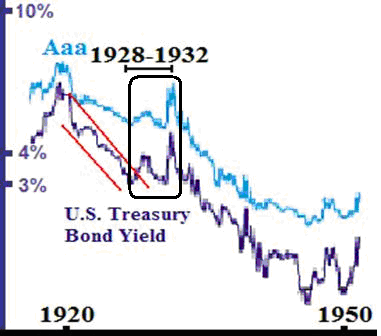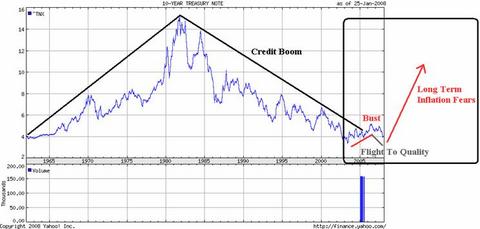Financial speculator and billionaire, George Soros states in his FT.com commentary: “the current crisis is the culmination of a super-boom that has lasted for more than 60 years.”
Watch the video of Soros:
http://www.ft.com/cms/55569c24-c38d-11dc-b083-0000779fd2ac.html?_i_referralObject=627561916&fromSearch=n
In 1928, the U.S. Treasury Bond similarly broke out of the channel and rose to a higher yield. This coincided with the end of ‘easy’ money which forced the deleveraging of the economy and concluded with the financial crisis of 1929-1932.
Compare the two Treasury Bond Yield charts below. In 2005-2006 higher bond rates “broke out of the channel” and inflicted damage on the housing market. This marked “the end of ‘easy’ money.” Similarly since 2006, there has also been a flight to quality.

(Chart above from Longwaveanalyst.com)
George Soros explains what happens next:
If federal funds were lowered beyond a certain point, the dollar would come under renewed pressure and long-term bonds would actually go up in yield. Where that point is, is impossible to determine. When it is reached, the ability of the Fed to stimulate the economy comes to an end.
Will the result be a sell off in 10 year Treasury Bonds?
Which is what occurred at the end of the last credit cycle.
Billionaire investor Julian Robertson agrees. As he revealed to Fortune, the biggest bet that Robertson has in his own portfolio at the moment” is “long the price of two-year Treasury and short the price of the ten-year Treasury."
According to the Federal Reserve Board website, U.S. non-borrowed bank reserves have gone from $37B to $199M in the last month.
In addition, the FDIC has recently begun modernizing large-bank insurance rules.Another words this should be a wake-up call to everyone as to the extent of the credit crisis. Banks in aggregate have now gone through all of their capital, and are going to be forced to borrow reserves from the Fed in order to keep lending.
Simply put, the U.S. banking system has no reserves.


Comments(4)